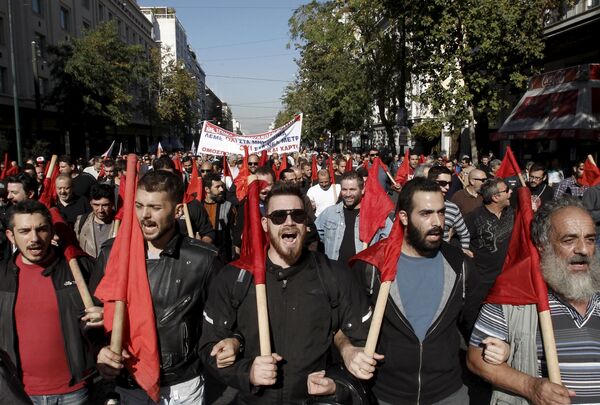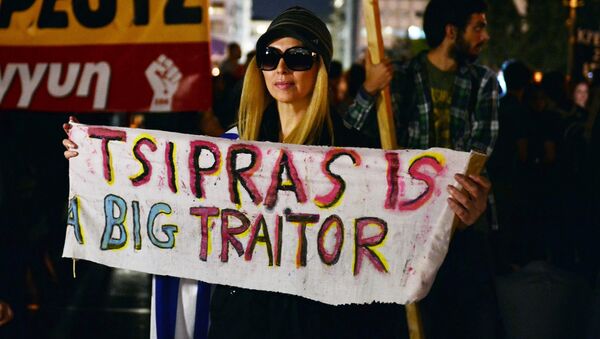In a controversial deal, the percentage of Greek homeowners protected from insolvency has been decreased from 70% to 60%.
Greeks reacted angrily to the news on the morning of November 12. More than 20,000 protesters poured onto the streets of Athens, and trade unions have announced a 24-hour nationwide general strike.

There were some clashes with police, who fired tear gas to disperse the protesters who were hurling petrol bombs at the Greek Central Bank.
Some of those on strike carried balloons that read "the words of Alexis", an accusation that Prime Minister Alexis Tsipras' promises to abandon austerity were no more than hot air.
The opposition New Democracy leader Evangelos Meimarakis sternly attacked the government on Wednesday night.
"The government proved again how much it deceived the Greek citizen in order to steal his vote. Because, unfortunately, starting from today thousands of Greeks are facing the risk of losing their home through foreclosure."
The Greek government's decision is being seen as a climbdown, forced by Greece's EU creditors who were demanding that Greece take action against bad loans in the housing market.
Pierre Moscovici, the European Commissioner for Economic and Financial Affairs, even suggested that some Greeks are "strategic defaulters", who have chosen to stop servicing their mortgages.
.@EU_Commission statement on substantive agreement reached w/ #Greece https://t.co/Hs9xxzLjai @VDombrovskis @pierremoscovici
— Mina Andreeva (@Mina_Andreeva) November 17, 2015
Negotiations were held up for weeks as Athens wanted to protect more primary residences from being repossessed if mortgage holders can't meet their repayments.
However, the beleaguered nation could no longer ignore the cash-strapped Greek economy's need for another injection of capital.
An extra tranche of US$13 billion (€12bn) in bailout cash has now been agreed.
US$2.14 billion (€2bn) will go to the government, and around US$11 billion (€10bn) will be provided to help recapitalise the country's struggling banking system.
Jeroen Dijsselbloem, the president of the euro's finance ministers, welcomed the break through as a "substantive agreement."
Good news. Substantive agreement between #Greece & institutions. EWG discussed state of play and welcomed the progress made #eurogroup
— Jeroen Dijsselbloem (@J_Dijsselbloem) November 17, 2015
However, for those who will be faced with the distressing prospect of being forced out of their homes, it's a bitter pill to swallow.
Although being seen as economically necessary by some commentators, politically, this is a significant blow for the left-wing Syriza government.
Tsipras campaigned on a platform of regaining Greek sovereignty by challenging EU control of Greece's finances. Many Greeks resent the extent of outside influence on the political decisions affecting their day-to-day lives.
The Greek parliament is due to pass the remaining legislative measures on Thursday to enable the cash release by the end of the week.



